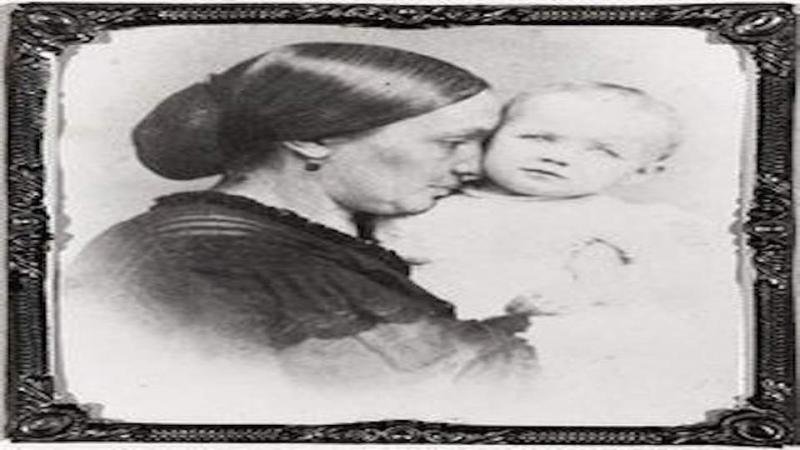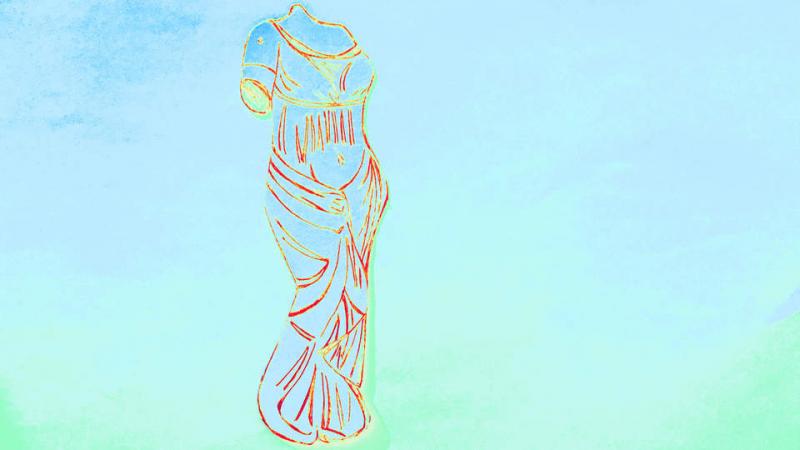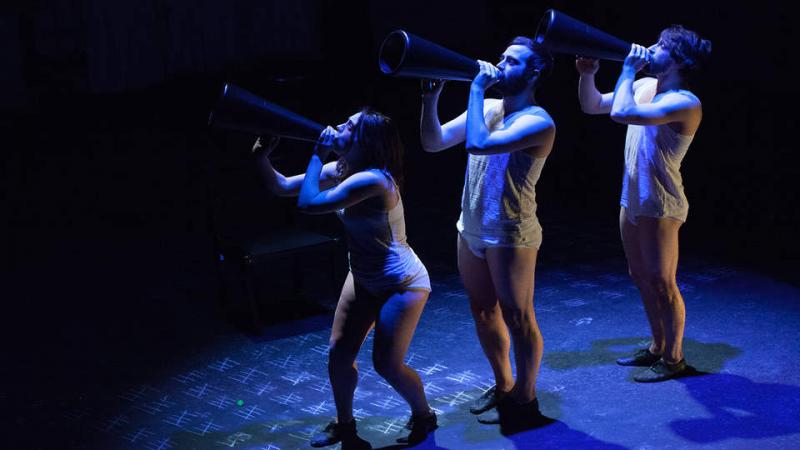Review: A Little Mythology, an Exploration of War at Home and Abroad, and Something Entirely Different – Four Shows at the Capital Fringe

I spent an evening and afternoon taking in a few offerings at this year's far more conveniently located Capital Fringe festival in Southwest DC. International Affairs and history nerd that I am, I took in a performance of BLACK CONFEDERATES and the exceptional THE BODY OF A WOMAN AS A BATTLEFIELD IN THE BOSNIAN WAR. I threw in a little musicalized mythology for good measure (Jo Williamson's METAMORPHOSE) as well as an avant-garde and wholly modern dance-theater piece, O MONSTERS, presented by Philadelphia's experimental performance ensemble New Paradise Laboratories. The latter is one of five shows in Fringe's Curated Series - something that's new this year and should be continued if O MONSTERS is any indication of the quality.
In the end, the quality of the plays and performances were something of a mixed bag, which is certainly not unexpected in a Fringe setting. That's part of the fun though - you never know what you're going to get.
BLACK CONFEDERATES

Playwright James F. Bruns is no stranger to the DC Fringe scene; BLACK CONFEDERATES is his third play in the yearly festival. It's 1865 and the Civil War has been raging for four years. Confederate States of America President Jefferson Davis (Larry Levinson) is at home at the White House in Richmond, VA with his second wife Varina Howell Davis (Elizabeth Drake). Their city has been invaded and surrounded and the situation seems pretty bleak both for the couple and the confederacy. The two discuss and debate a variety of issues of the day, including the entry of black men into the Confederate forces - and by extension, what equality means (with the black men's enlistment, they're offered freedom). Later, they say goodbye to their own slave Thomas (Jeffrey Charles Fleming) who has joined the ranks and take a look at what's happening outside their mansion.
Bruns repeats this scenario three times in three distinct scenes with the last one being the most eye-opening and relevant to today. Without giving too much away, while some things stay consistent across the three scenes (Varina is grieving over the death of her child, for instance - a child that Thomas was the last to see), each characters' reaction to the goodbye - and the circumstances surrounding it - are different, which drive different endings. It's a useful construct to shed light on some important uniquely American sociopolitical complexities (many of which are still relevant today) and with further work it may offer even more insight - at least on paper.
However, at least on opening night, the play suffered from execution problems. Some less than sophisticated technical elements are expected in a Fringe setting. In this case, those involved seemed intent on using the minimal lighting instruments to evoke changes in the mood. However, they failed to either plan out their use or practice using them. At multiple points in my performance the Director (David A. Schmidt) was loudly whispering instructions to the clearly unprepared tech, which was - in a word - distracting, especially in such a cozy venue.
More concerning though was some of the acting even it wasn't all bad. Levinson went up on his lines many times and delivered a consistently stiff performance devoid of authentic emotional intent. Fleming fared better, especially in the third scene, in which is character reveals many secrets. Drake rose above it all and delivered a beautiful and confident performance.
In the end, this one offered an interesting premise and one really good performance so it wasn't a total loss.
BLACK CONFEDERATES plays four more performances at St. Augustine's Episcopal Church (Gold Venue). Consult the Capital Fringe website for tickets and more information. Run time is 60 minutes.
THE BODY OF A WOMAN AS A BATTLEFIELD IN THE BOSNIAN WAR

Every now and again you stumble upon a show that peaks your interest based on title alone. THE BODY OF A WOMAN AS A BATTLEFIELD IN THE BOSNIAN WAR was one of the shows for me (full disclosure: I focused on ethnic violence in the Balkans in grad school). I entered the theater expecting to be - at the very least - interested in the content. In the end, I was blown away by the quality and sophistication of the writing (Matel Visniec/Siavash Shabanpour), acting (Konstantina Mantelos and Anne Lytvynova), and direction (Siavash Shabanpour). I left the theater completely satisfied and wanted to see the full-length version that has been presented as far back as 2000.
The story is presented in non-linear fashion. Kate (Konstantina Mantelos), a 30-something Harvard-educated, American psychologist leaves her job and family to join an international team charged with excavating mass graves in Bosnia (including Srebrenica) in the conflict's aftermath. Her role is to monitor and report any psychological problems the technical team members experience as a result of the horrifying and difficult circumstances. In the end, she suffers a breakdown herself and asks to be transferred to a NATO-sponsored rehabilitation center on a former American military base in Germany. There, she observes and cares for rape victims of the war in the country she just left. There, she meets Dora (Anne Lytvtnova), a young, pregnant rape victim. Dora is understandably dealing with a loss of faith in not only God, but humanity. Kate tries to convince her to give birth to the unborn child, and in the end comes to terms with her own trauma.
This play is not just yet another war story or a story of rape and the trauma that accompanies it. It deals with all of the inherent complexities in quite a sophisticated way. Perhaps in a departure from the expected, the play focuses on the interrelated circumstances that led to Dora's rape and the emotional trauma that follows, rather than the act itself. This provides excellent fodder for Kate's analysis of the Freudian aspects of resurgent nationalism and how the Balkan soldiers used rape as a weapon of war - much in the way any soldier would use a gun, grenade, or weapon - because it posed less of a chance of them getting hurt and had the greatest potential for hurting the enemy (i.e. hurting those most important to the enemy would be the most harmful to them in the end). In that way, Dora's body is not unlike the battlefields Kate visited in Bosnia - the difference between the mass graves and her womb is that life still exists within amidst all of the emptiness and decay.
Kate's psychologically-focused analysis, in turn, provides a structure for the play (we see Kate write her reports on Dora and also present it in video format). As constructed, the play achieves an enviable balance of presenting a valid scientific exploration and real, authentic storytelling with two humans at the center. Here, the two talented actresses play an important role in making the experience as absorbing, believable, and emotional for the Capital Fringe audience.
THE BODY OF A WOMAN AS A BATTLEFIELD IN THE BOSNIAN WAR has one performance of Tues, July 17 at 8:15 PM at the Violet Venue at Arena Stage. Consult the Capital Fringe website for tickets and more information. Run time is 75 minutes.
METAMORPHOSE

Created and performed by Jo Williamson, METAMORPHOSE offers a retelling of passages of Ovid's narrative poem, Metamorphoses. It's obviously a mammoth work so Williamson focuses on select stories centering on women, nymphs and goddesses (think Arachne and more). Those entering the theater hoping for something a little different than just yet another solo performance of myths we all know will likely be pleased with what Williamson has created. Her well-integrated songs are used not only to tell the stories, but to explore the emotions of each of the females. She explores their relevance to today's women, but not in a forced way. Employing a variety of musical styles - from folk-pop and classical to even rap - she demonstrates her skill as both a writer and performer. The end result is a performance that's cohesive yet varied and sophisticated yet accessible. She delivers an interesting and inviting polished performance enhanced, but not overpowered by Elliot Lanes' lighting design.
METAMORPHOSE plays for four more performances at St. Augustine's Episcopal Church (Copper Venue). Consult the Capital Fringe website for tickets and more information. Run time is 45 minutes.
O MONSTERS

One of five shows in Fringe's curated series, O MONSTERS may be the most polished dance-theater piece I've ever seen in the Capital Fringe. It's also, by far, one of the most challenging and interesting. Presented by Philadelphia's New Paradise Laboratories, the production nearly flawlessly combines movement, storytelling, and technical elements to create an otherworldly experience unlike any other.
We meet the Kissimmee family as soon as we enter the theater - a mom dressed in black and three triplets dressed in white (Kate Czajkowski, Julia Frey, Emilie Krause, and Matteo Scammell portray the four characters). It's immediately clear they're far from an ordinary family. No father is present. The program notes tell me he (dubbed the "Captain") has disappeared and the children, especially, are desperate to figure out what happened to him. The family goes about their daily lives - eating breakfast, getting dressed etc. - but nothing is really ordinary. Food, bowls, and utensils drop in from high above in the grid for their use. At one point, a knife drops from above at a high speed, which sets up an opportunity to create yet another change within the family structure. In the final scenes, the children take matters into their own hands, uncover the truth about their father, and history repeats itself in a particularly horrifying, but unexpected way.
Bizarre loud music (Bhob Rainey) plays at various intervals as the cast moves with intention about the stage. It's modern choreography with a twist. There's an intention behind everything and the story grounds the movement. The four actors work together as one seamless unit to invite the audience into this world and follow along on the characters' journey. Each movement and - at times - spoken word provides further information about the destination. Maria Shaplin's lighting design enhances the mood.
It's entirely bizarre, but rewarding at the same time.
O MONSTERS plays for four more performances at Arena Stage's Kogod Cradle. Consult the Capital Fringe website for tickets and more information. Run time is 60 minutes.
Reader Reviews
Videos

